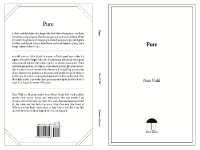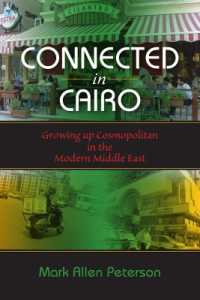- ホーム
- > 洋書
- > 英文書
- > Literary Criticism
Full Description
New translations of Persian literature into French, the invention of the Aryan myth, increased travel between France and Iran, and the unveiling of artefacts from ancient Susa at the Louvre Museum are among the factors that radically altered France's perception of Iran during the long nineteenth century. And this is reflected in the literary culture of the period. In an ambitious study spanning poetry, historiography, fiction, travel-writing, ballet, opera, and marionette theatre, Julia Hartley reveals the unique place that Iran held in the French literary imagination between 1829 and 1912. Iran's history and culture remained a constant source of inspiration across different generations and artistic movements, from the 'Oriental' poems of Victor Hugo to those of Anna de Noailles and Théophile Gautier's strategic citation of Persian poetry to his daughter Judith Gautier's full-blown rewriting of a Persian epic. Writing about Iran could also serve to articulate new visions of world history and religion, as was the case in the intellectual debates that took place between Michelet, Renan, and Al-Afghani. Alternatively joyous, as in Félicien David's opera Lalla Roukh, and ominous, as in Massenet's Le Mage, Iran elicited a multiplicity of treatments. This is most obvious in the travelogues of Flandin, Gobineau, Loti, Jane Dieulafoy, and Marthe Bibesco, which describe the same cities and cultural practices in altogether different ways. Under these writers' pens, Iran emerges as both an Oriental other and an alter ego, its culture elevated above that of all other Muslim nations. At times this led French writers to critique notions of European superiority. But at others, they appropriated Iran as proto-European through racialist narratives that reinforced Orientalist stereotypes. Drawing on theories of Orientalism and cultural difference, this book navigates both sides of this fascinating and complex literary history. It is the first major study on the subject.
Contents
Introduction
Iran in Nineteenth-Century France: Competing Narratives
Iran and Orientalism
Beyond the Paradigm of Difference
The Politics of Genre
Chapter 1: Poetry
Translation and Poetic Innovation
From Paris to 'Persia' and Back Again (Hugo, Théophile Gautier, Noailles)
Persian Poems Made in France (Renaud, Lahor/Cazalis)
Intertextuality and Universalism: The Case of 'Les Roses de Saadi' (Desbordes-Valmore)
Conclusion
Chapter 2: History and Historical Fiction
Rewriting Human History
'Nos parents, les Aryas' (Arthur de Gobineau, Ernest Renan, Jules Michelet)
The Persian Alexander: Hybridity and Queer (Anti-)Imperialism (Judith Gautier)
Ancient History? Iran as Mirror for French Feminism (Jane Dieulafoy)
Conclusion
Chapter 3: Travel-Writing
'Tout chemin ne conduit pas en Perse'
Defining the Persians
Among Women: Scenes from the Harem
Understanding Shiism
'Esfahan, Nesf-e Jahan'
Remembering 'the Great of the Earth'
Plagued by the West
Books versus Reality
Conclusion
Chapter 4: Performing Arts
Orientalism and the Stage
A Tale of Two Peris : Iran, the Imaginary Orient, and Ballet (Théophile Gautier, Paul Dukas)
Of Poets, Prophets, and Kings: French Opera's love affair with Iranian men (Lalla Roukh, Le Mage, and Thamara)
A Puppet Play about Omar Khayyam (Maurice Bouchor)
Rebuilding Susa: Jane Dieulafoy and Camille Saint-Saëns's 'Parysatis' (1902)
Conclusion
Conclusion







